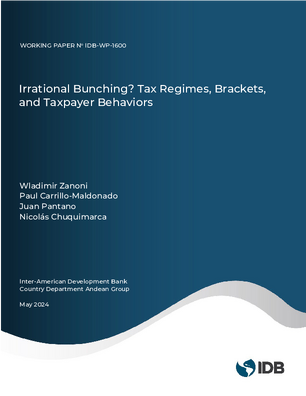Irrational Bunching? Tax Regimes, Brackets, and Taxpayer Behaviors
Date issued
Jun 2024
Subject
Taxation;
Income Tax;
Taxpayer;
Tax System;
Economy;
Income Distribution;
Regulation;
Wage
JEL code
H24 - Personal Income and Other Nonbusiness Taxes and Subsidies;
H26 - Tax Evasion and Avoidance;
D12 - Consumer Economics: Empirical Analysis
Country
Ecuador;
Ecuador
Category
Working Papers
In this study, we examine the behavior of self-employed taxpayers who “bunch" at an income level just below a critical threshold, which triggers a transition from a simple tax regime to a more complex one. Under the simple regime, individuals complete their tax forms independently, while the complex regime mandates the use of a public accountant for maintaining accounting records. Utilizing data from the Ecuadorian tax authority from 2011 to 2014, we initially observed and documented the bunching behavior prompted by the shift between regimes. Subsequently, we assess the impact of this regime transition on the amount of taxes paid by those self-employed taxpayers who choose to fill taxes in the complex regime. Our methodology employs both parametric and semi-parametric “donut” estimators to evaluate these effects. We find that the regime shift indeed prompts taxpayers to bunch below the income threshold, opting to remain within the simpler regime. Interestingly, those who transition into the complex regime tend to pay less in taxes. This pattern holds across various bunching windows and is consistent across several estimators used. Our results suggest that accountants are the key mechanism behind the effects, for they help taxpayers better navigate tax deductions and benefits, leading individuals to pay zero taxes.
Generative AI enabled




